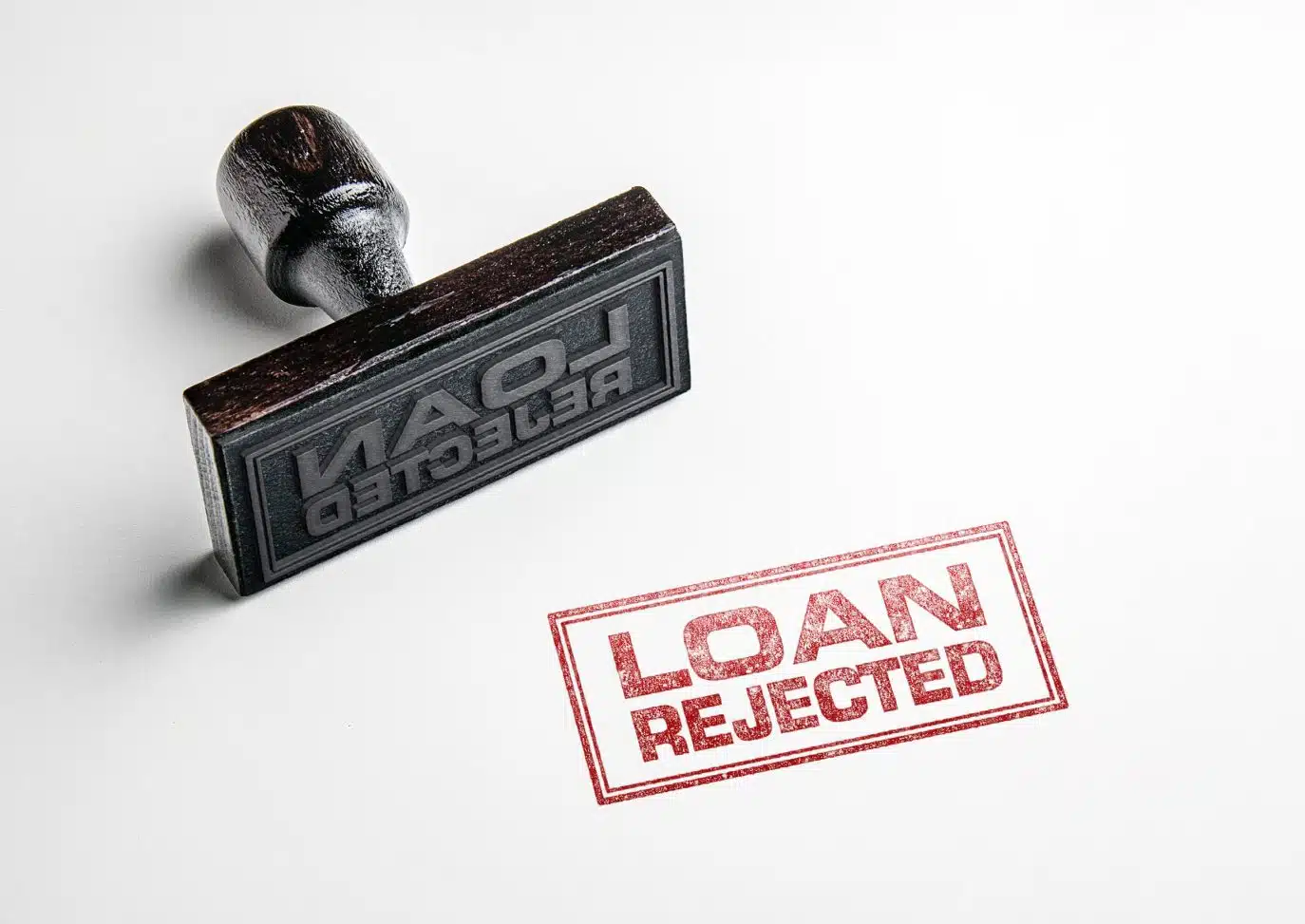8 Reasons Your Business Loan Was Rejected: Understanding Why Lenders Say No
In 2019, a third-party lender conducted a research study on business loans and found that about 40% of Australian small businesses applied for them.
At the time of the study, the rejection rate was about 23%. But it spiked to 37% soon after. The numbers indicate that more than a third of Australian companies weren’t able to secure stable finances or loans. “Business loan rejected” is the last thing you’d want to hear from your lender. When a business loan was rejected, it can be incredibly frustrating, making it crucial to understand the reasons behind the rejection to improve your chances next time.
But there’s more to this than meets the eye. If your loan was rejected, it’s important to identify the specific causes so you can address them and increase your chances of approval in the future.
The following sections explore some of the most common reasons “business loan rejected” might appear on your application.
Use these as guidelines for streamlining your operations and finance to make sure your business loan application gets the nod of approval from your lender.
The Ten Reasons
Reason #1 – Poor Credit History
High outstanding debt, failure to make timely payments, and high credit utilisation negatively affect your credit history. Lenders will review your credit report for any missed payments or negative marks, as these can result in a low credit score or even a poor credit score. The same goes for making too many loan applications.
Sole owners of small businesses need to pay attention to their personal credit history as well. Failure to make timely mortgage and other payments will alarm lenders and could get your application rejected. Missed payments are often highlighted in your credit report and can significantly lower your credit score.
Keep in mind that the above usually doesn’t apply to well-established companies, even if they only have one owner.
Reason #2 – Income Limitations
One of the first things that lenders assess is your ability to pay off the debt. Insufficient cash flow and high business expenses can make it difficult to meet lender requirements, as lenders look for financial stability before approving a loan. They need to be certain you can meet minimum payments every single month.
If you struggle with your cash flow and/or revenue, these could be the main reasons “business loan rejected” becomes your reality. Having an emergency fund can help manage unexpected expenses and improve your financial stability, making you a more attractive candidate to lenders.
The same could happen if you’ve just started your company. Limited trading history is a common reason for loan rejection among new businesses. Most lenders require you to have been in business for more than 12 months. But if you need money in an early startup stage, there are alternatives to consider.
Reason #3 – Insufficient Collateral
This applies to businesses that want to take out a secured loan. If there are no assets or investments that can act as collateral, your loan could get rejected. Not enough collateral is a common reason for loan rejection.
Unsecured loans do not require collaterals, so this might be a better option for small business owners. But if you really want a secured loan, make sure to know which asset would be suitable for collateral. Providing sufficient collateral, including personal assets such as your home or car, can improve your chances of approval.
Reason #4 – Asking for Too Little
It might be surprising, but a lender might reject you because the requested amount is under what they consider a minimum for small businesses. Lenders also want to see a clear plan for how the borrowed funds will be used to support business growth, so it’s important to justify the amount you request.
Commonly, this happens with banks since they prefer to approve higher loan amounts. The logic is simple – the higher the loan, the more interest the bank will earn.
Also, banks maintain that it takes the same effort and time to service a $150,000 loan as a $1.5 million one. But then, if you don’t need that much, there are always alternatives to borrowing from traditional banks.
Reason #5 – Wrong Application
When applying for a business loan, it’s possible that you didn’t approach the right lender or asked for a loan option that’s not for you.
But you aren’t to blame here. With so many different options available, you may need some guidance to make the right choice. Each lender has its own lender’s criteria, such as credit score, revenue, and business age requirements, which you must meet for your application to be successful.
This is where a loan broker could be of help.
The expert will assess your needs and finance to figure out what options are available for your business. They can inform you of the requirements, as well as the pros and cons of a given loan.
Reason #6 – Weak Projections and Cash Flow
Projections refer to your business’s ability to grow and scale in the coming years. Providing financial projections in a detailed business plan can help demonstrate your business’s ability to repay the loan and strengthen your application. As for cash flow, it should be sufficient to repay the loan and finance your operational expenses.
If you apply for a loan with a bank, know that they’ll likely check the cash flow for the last 24-36 months. But other lenders might not be so demanding and may only consider your cash flow in the previous quarter.
Reason #7 – Volatile Industry
Traditional lenders may consider certain industries as volatile – gambling, blockchain and crypto, cannabis, for example. Industry risk is a key factor lenders assess when deciding whether to approve a loan, as some sectors are seen as higher risk regardless of current business performance. These businesses may pose a high risk to lenders even if they’re doing well at the time of the loan application.
Why?
The industries could be subject to changes in government policies.
Reason #8 – Issues with Paperwork or Documentation
One of the most common stumbling blocks in the business loan application process is incomplete or inaccurate paperwork. Lenders require a comprehensive set of documents to properly assess your business’s financial health and determine your eligibility for a business loan. These typically include up-to-date financial statements, recent bank statements, detailed tax returns, and a solid business plan. If any of these documents are missing, outdated, or contain errors, your loan application could face immediate rejection.
Small business owners should take the time to double-check that all required paperwork is accurate, complete, and submitted within the lender’s deadlines. Even minor mistakes or missing information can result in a business loan rejection, delaying your access to much-needed funds. Working with a loan broker can be a smart move—these professionals understand what lenders require and can help you gather and organise your documentation, increasing your chances of approval.
By keeping your financial records in order and ensuring your paperwork is always up to date, you not only make the loan application process smoother but also demonstrate to lenders that your business is well-managed and financially sound. This attention to detail can make all the difference when it comes to securing a business loan.
Reason #8 – Issues with Paperwork or Documentation
It’s not uncommon for business owners to submit incomplete paperwork and get refused due to that. To avoid making the same mistake, here are some requirements to keep in mind.
- Clear use of funds
- Previous tax returns (in detail)
- Updated financial reports
- Insurance information
- Date of incorporation (if applicable)
- Clear business structure
The list isn’t limited to the above, so you should check with your lender for a complete list of requirements.
Reason #9 – High Debt Utilisation
The debt-to-income ratio shows the percentage of your income committed to servicing loans. Lenders also consider your credit utilisation ratio and existing debt when assessing your application. Ideally, you’ll want to keep the number under 30.
High debt utilisation may affect your business credit score and show lenders you aren’t ready for a new loan. Too much debt can be a significant obstacle to obtaining additional financing. But if you manage to keep the ratio low, lenders will understand that you’re good at managing debt and may be more open to approving your loan.
Reason #10 – You Don’t Have a Business Bank Account
There are industries that might not require you to have a business bank account. But you should consider setting one up as soon as possible.
It has become tough to take out a loan without a bank account these days. Many lenders require businesses to have a business loan to qualify for a loan. That’s because lenders now also utilise the account data to assess if you’re eligible for a loan.
Exploring Alternative Financing Options
If your business loan application has been rejected, don’t lose hope—there are plenty of alternative financing options available for small business owners. Unsecured business loans, merchant cash advances, and invoice financing are just a few of the solutions that can provide quick and easy access to funds, often with more flexible eligibility requirements than traditional business loans.
Unsecured business loans don’t require collateral, making them a popular choice for business owners who may not have sufficient assets to secure a loan. Merchant cash advances offer a lump sum in exchange for a percentage of your future sales, while invoice financing allows you to unlock cash tied up in unpaid invoices. These options can be especially helpful if you need fast funding or have a less-than-perfect credit score.
Online lenders and alternative lenders are also worth considering, as they often provide a wider range of financing options, including unsecured loans and lines of credit. While these alternatives can be more accessible, it’s important to carefully review the terms, as interest rates and fees may be higher than those of traditional lenders.
Beyond loans, small business owners can explore government grants, crowdfunding platforms, and business credit cards to support their business needs. No matter which route you choose, managing your debt utilization and maintaining a strong credit score will improve your chances of approval and help you secure the best possible terms for your business’s growth and success.
Getting the Loan You Need
Now that you know the reasons, business loan rejected should be a thing of the past for your company.
The things to keep in mind are your current and past finance, cash flow, and the paperwork required to file a complete application. It’s also crucial to monitor your business’s financial health and cut unnecessary expenses to improve your chances of approval.
But even if you don’t manage to secure these, know that there are always alternatives. You can consider options such as a small business loan, small business loans, a business credit card, or a government grant.
Are you ready to take the next step? Unsecured Finance Australia can help you with your business loan. Click here for more information.




